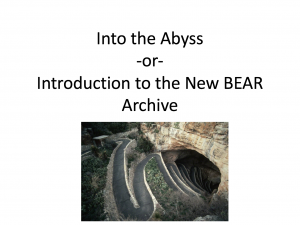 On Wednesday 7th November, we held our third Digital Research Conversation on Data Sharing amid torrential rain. After some well-deserved pizza, it was onto the talks and Aslam Ghumra from our team Advanced Research Computing started us off describing how the Research Data Archive has changed to become the BEAR Archive. Where previously we provided storage for data associated with publications, this has now moved to the UBIRA eData repository hosted by the Library. The new BEAR Archive now functions as a ‘deep’ archive where you can store research data not currently being used and which does not support a publication, but which may be needed in the future. You can download Aslam’s presentation by clicking on the slide (this also applies to the other slides in this post).
On Wednesday 7th November, we held our third Digital Research Conversation on Data Sharing amid torrential rain. After some well-deserved pizza, it was onto the talks and Aslam Ghumra from our team Advanced Research Computing started us off describing how the Research Data Archive has changed to become the BEAR Archive. Where previously we provided storage for data associated with publications, this has now moved to the UBIRA eData repository hosted by the Library. The new BEAR Archive now functions as a ‘deep’ archive where you can store research data not currently being used and which does not support a publication, but which may be needed in the future. You can download Aslam’s presentation by clicking on the slide (this also applies to the other slides in this post).
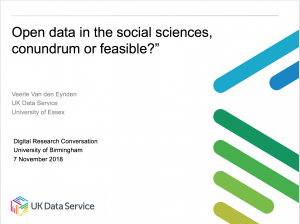 For this Digital Research Conversation, we were pleased to welcome our first external speaker – Veerle Van den Eynden from the UK Data Service who had battled through the rain all the way from Belgium and got rather wet 🙁 Veerle is Research Data Services Manager and provides data management training to researchers and advice on where to deposit data to make it openly available. Her talk was relevant to all disciplines which have potentially sensitive data and it was interesting to hear that in their archive of studies, out of 2263 datasets, 93 are classed as interview data. In these cases it may be 1) that the people involved are no longer living, 2) the interview is fully anonymised or 3) permission has been granted to share it. All three of these options mean that restrictions due to data protection law (GDPR) do not apply – see here for UoB guidance on GDPR (login required). A guide to anonymisation from the UK Data Service is available here.
For this Digital Research Conversation, we were pleased to welcome our first external speaker – Veerle Van den Eynden from the UK Data Service who had battled through the rain all the way from Belgium and got rather wet 🙁 Veerle is Research Data Services Manager and provides data management training to researchers and advice on where to deposit data to make it openly available. Her talk was relevant to all disciplines which have potentially sensitive data and it was interesting to hear that in their archive of studies, out of 2263 datasets, 93 are classed as interview data. In these cases it may be 1) that the people involved are no longer living, 2) the interview is fully anonymised or 3) permission has been granted to share it. All three of these options mean that restrictions due to data protection law (GDPR) do not apply – see here for UoB guidance on GDPR (login required). A guide to anonymisation from the UK Data Service is available here.
Patricia Herterich from Library Services then introduced the University’s 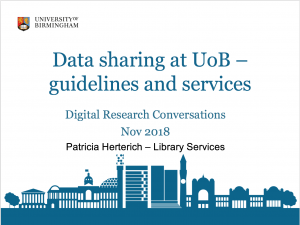 UBIRA eData Service and gave a demonstration on how easy it is to use. eData is where you can store data associated with a publication and receive a DOI (digital object identifier or persistent link) which you can then put in a paper to link directly to your data. To increase visibility of your data, you should also deposit it in any repositories recommended by your funder, journal or any other suitable repository you can find via re3data.org
UBIRA eData Service and gave a demonstration on how easy it is to use. eData is where you can store data associated with a publication and receive a DOI (digital object identifier or persistent link) which you can then put in a paper to link directly to your data. To increase visibility of your data, you should also deposit it in any repositories recommended by your funder, journal or any other suitable repository you can find via re3data.org
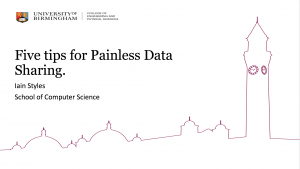 Iain Styles from Computer Science then gave his views as a researcher on how important it is to share your raw data, not just the stats such as mean and standard deviation which could lead to different patterns in data – see this video for a great example. He also talked about the importance of planning to share your data from the start of a project – this is where a data management plan comes in handy. The BEAR team’s favourite quote of the session was ‘If your data isn’t in the Research Data Store it doesn’t exist!’. Ian has banned the use of USB sticks for storing data in his research group and recommends that researchers make use of our ‘superior data storage‘ at the University of Birmingham.
Iain Styles from Computer Science then gave his views as a researcher on how important it is to share your raw data, not just the stats such as mean and standard deviation which could lead to different patterns in data – see this video for a great example. He also talked about the importance of planning to share your data from the start of a project – this is where a data management plan comes in handy. The BEAR team’s favourite quote of the session was ‘If your data isn’t in the Research Data Store it doesn’t exist!’. Ian has banned the use of USB sticks for storing data in his research group and recommends that researchers make use of our ‘superior data storage‘ at the University of Birmingham.
It was then on to our own Simon Hartley from the BEAR software team to 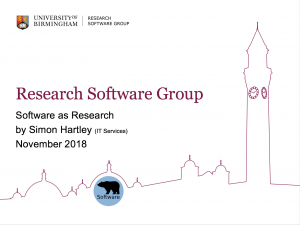 conclude the talks by discussing ‘Software as Research’. He talked about the importance of reproducible data with most scientists failing to reproduce both their own and other scientist’s work. In disciplines that develop software, that software is the data output and version control is needed to reproduce it and improve it. Simon discussed Git as a project management tool and how you can use it knowing just 7 commands! It can be run from both command line in a shell or in a graphical user interface for those more familiar with the Windows environment. Just like research data, you can obtain a DOI for your software from places such as GitHub and Zenodo. Advanced Research Computing also offers a locally hosted version of Git – BEAR GitLab.
conclude the talks by discussing ‘Software as Research’. He talked about the importance of reproducible data with most scientists failing to reproduce both their own and other scientist’s work. In disciplines that develop software, that software is the data output and version control is needed to reproduce it and improve it. Simon discussed Git as a project management tool and how you can use it knowing just 7 commands! It can be run from both command line in a shell or in a graphical user interface for those more familiar with the Windows environment. Just like research data, you can obtain a DOI for your software from places such as GitHub and Zenodo. Advanced Research Computing also offers a locally hosted version of Git – BEAR GitLab.
Plans are afoot for our fourth Digital Research Conversation with the topic of ‘Making Sense of your Data’ or in more technical terms ‘Data Wrangling’. If you would be interested in giving a talk on how you process your research data then please get in touch, you can email the team at bearinfo@contacts.bham.ac.uk
Further Information
University of Birmingham researchers can sign up to our Digital Research Conversations Canvas course to find slides and summaries of our series of DRC events: https://canvas.bham.ac.uk/enroll/Y7C7LY
